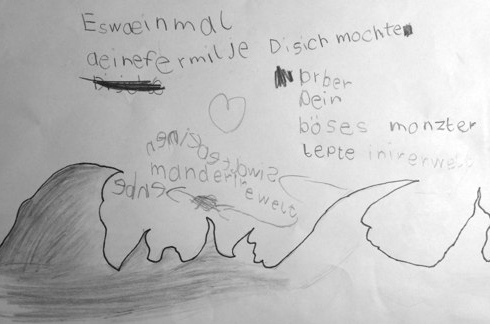Was hier zu lesen steht?
Nun, dieser Satz stammt von Linda, 6 Jahre alt, und lautet …
„Eswaeinmal aeinefermilje Disich
mochte arber aein böses monzter
lepte inirerwelt“
Oder anders …
„Es war einmal eine Familie, die sich
mochte, aber ein böses Monster
lebte in ihrer Welt.“
„Die Familie und das Böse“ ist ein Kinderbuch-Projekt
…angelegt auf mehrere Semester hin.
Und im Idealfall steht am Ende eine Veröffentlichung eines illustrierten Kinderbuchs, voller ungewöhnlicher Geschichten, der besten Geschichten zu diesem Thema …
Aber weshalb denn ausgerechnet …
„Die Familie und das Böse“?
Nun, der Philosoph Georg Wilhelm Friedrich Hegel war aller Wahrscheinlichkeit nach im Irrtum, als er meinte, niemand wolle etwas über das Böse erfahren. Offenbar wollen alle etwas davon erfahren. Nur wissen sie oft nicht, was das eigentlich ist.
***
„All stories are about wolves. All worth repeating, that is. Anything else is sentimental drivel…. Think about it. There’s escaping from the wolves, fighting the wolves, capturing the wolves, taming the wolves. Being thrown to the wolves, or throwing others to the wolves so the wolves will eat them instead of you. Running with the wolf pack. Turning into a wolf. Best of all, turning into the head wolf. No other decent stories exist.“ (Margaret Atwood – „The Blind Assassin“)
***
„Why the hell are we conditioned into the smooth strawberry-and-cream Mother-Goose-world, Alice-in-Wonderland fable, only to be broken on the wheel as we grow older and become aware of ourselves as individuals with a dull responsibility in life?“ (Sylvia Plath)
Viele große Märchen erzählen über
„Die Familie und das Böse“ …
Da sind …
Aschenputtel,
Der Wolf und die sieben Geißlein,
Dornröschen,
Rapunzel,
Rotkäppchen,
Schneewittchen …
und viele mehr.
Was aber ist bei uns das „Böse“?
Vielleicht:
Das Böse als Scherz
Das Böse als Erfindung
Das Böse als (schwere) Wahrheit
Das Böse als das Unglaubliche
Das Böse als das Fremde
Der böse Wolf (Es gibt keine Monster, – oder doch?)
Das Böse als Holzweg
Das Böse als böse Absicht
Das Böse als Versehen, Irrtum, Missverständnis
Das Böse als (vermeintliche) Rettung
Das Böse als „etwas anderes“
Doch was wäre heute: die „Familie“?
Für Einzelkinder?
Für Scheidungskinder?
Für Stiefeltern?
Für Waisen?
Für Freunde?
Für die Patchwork-Family?
Etc. etc. etc.
Das Böse in und außerhalb der Familie
Böse Kinder
(Böse Mädchen/ böse Jungs)
Böse Mütter/ Väter
Böse Brüder/ Schwestern
Böse Onkel/ Tanten
Liebe Kinder, böse Nachbarn
Etc. etc. etc.
***
„Unterdessen – Familie und andere Katastrophen/ machen sich fein und kriechen hervor/ hinter dem Mond oder hinter dem Ofen/ gehen nach vorne und machen ihr Tor.“ (Michael Ebmeyer)
„This was the trouble with families. Like invidious doctors, they knew just where it hurt.“ (Arundhati Roy – „The God of Small Things“)
„Parents kill more dreams than anybody.“ (Spike Lee)
***
„Childhood is such a delicate tissue; what they had done this morning could snag somewhere in the little ones, make a dull, small pain that will circle back again and again, and hurt them in small ways for the rest of their lives.“ (Lauren Groff – „Arcadia“)

